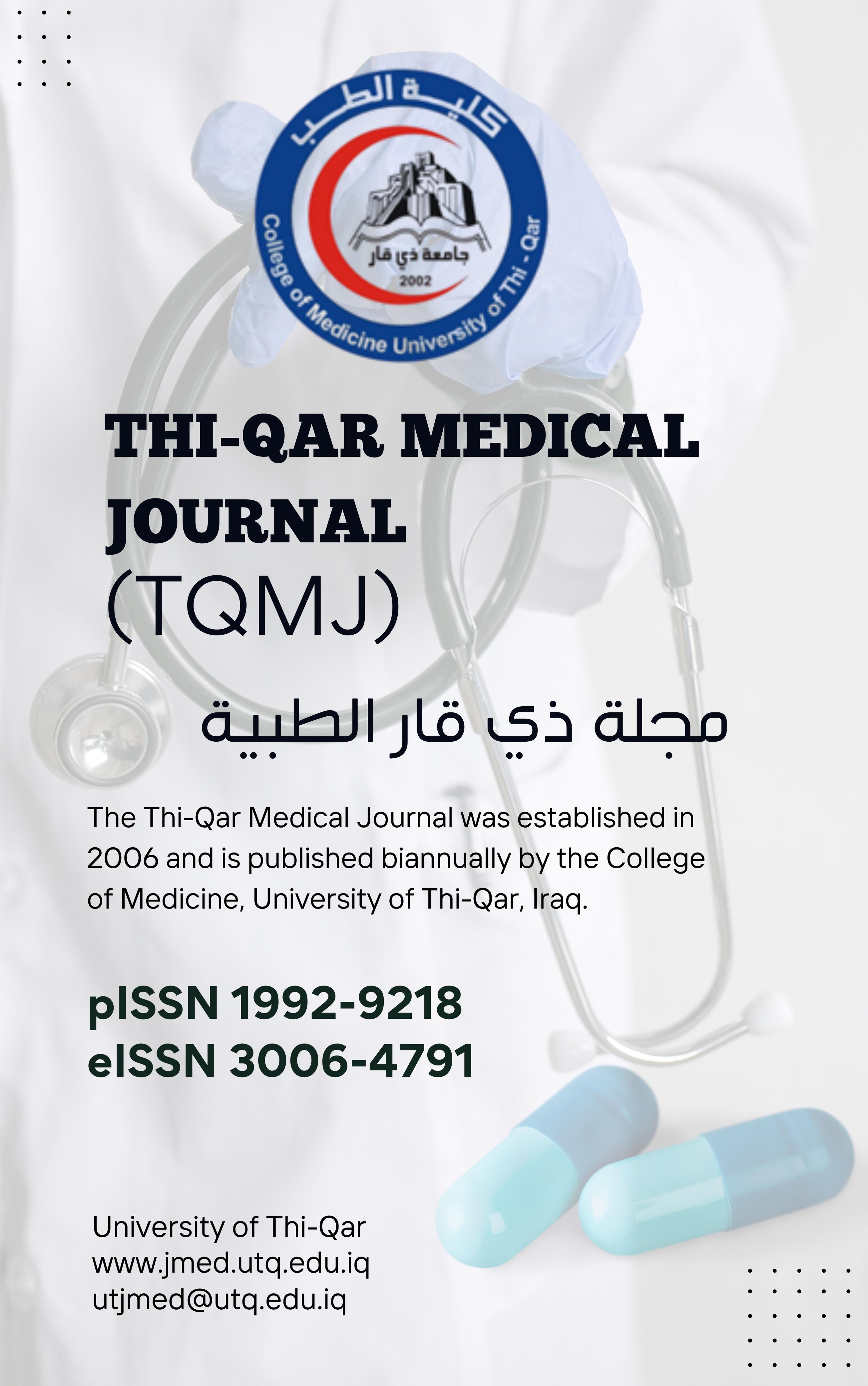The Role of RBP4 in Insulin Resistance and Type 2 Diabetes Mellitus
DOI:
https://doi.org/10.32792/tmj.v28i2.560Keywords:
insulin resistance, retinol binding protein 4 (RBP4), type 2 diabetes mellitus (T2DM)Abstract
Retinol is transported from the liver to peripheral tissues via the vitamin A transport protein whichknown as a retinol binding protein 4 (RBP4). According to several epidemiological studies, the
high concentrations of serum RBP4 are related to the risk of type 2 diabetes (T2DM) and insulin
resistance. Therefore, the aim of the current study was to assess the role of RBP4 in the insulin
resistance and type 2 diabetes. From August 2023 to December 2023, 100 participants who were
matched for age (30-70) years and sex (59 female- 41 male) participated in a case control study.
They divided into two groups: 50 patients with type 2 diabetes and 50 healthy individuals as a
control group. Enzyme-Linked Immunosorbent Assay was used to measure the serum RBP4.
According to results, RBP4 was considerably higher in patients with statistical significant (p
value˂0.001) compared to control group. This study was concluded that T2DM and insulin
resistance were substantially correlated to levels of serum RBP4.
References
Fan J, Hu J. Retinol binding protein 4 and type 2 diabetes: from insulin
resistance to pancreatic β-cell function. Endocrine. 2024;
Wu Y, Fu R, Lei C, Deng Y, Lou W, Wang L, et al. Estimates of Type 2
Diabetes Mellitus Burden Attributable to Particulate Matter Pollution and Its 30-
Year Change Patterns: A Systematic Analysis of Data From the Global Burden of
Disease Study 2019. Front Endocrinol (Lausanne). 2021;12(August).
Abusaib M, Ahmed M, Nwayyir HA, Alidrisi HA, Al-Abbood M, Al-Bayati
A, et al. Iraqi Experts Consensus on the Management of Type 2 Diabetes/Prediabetes
in Adults. Clin Med Insights Endocrinol Diabetes. 2020;13.
Yun JS, Ko SH. Current trends in epidemiology of cardiovascular disease and
cardiovascular risk management in type 2 diabetes. Metabolism [Internet].
;123:154838. Available from: https://doi.org/10.1016/j.metabol.2021.154838
Sampath Kumar A, Maiya AG, Shastry BA, Vaishali K, Ravishankar N,
Hazari A, et al. Exercise and insulin resistance in type 2 diabetes mellitus: A
systematic review and meta-analysis. Ann Phys Rehabil Med [Internet].
;62(2):98–103. Available from: https://doi.org/10.1016/j.rehab.2018.11.001
Narayanan S, Gopikuttan R. The correlation of vitamin D with HOMA-IR and
glycated hemoglobin in type 2 diabetes mellitus patients. Baghdad J Biochem Appl
Biol Sci. 2022;3(04):273–85.
Tan X, Zhang H, Liu L, Yu Z, Liu X, Cui L, et al. The association between
retinol-binding protein 4 and risk of type 2 diabetes: A systematic review and metaanalysis. International Journal of Environmental Health Research. 2023.
Weschenfelder C, De Quadros AS, Dos Santos JL, Garofallo SB, Marcadenti
A. Adipokines and adipose tissue-related metabolites, nuts and cardiovascular
disease. Metabolites. 2020;10(1).
Fan J, Yin S, Lin D, Liu Y, Chen N, Bai X, et al. Association of serum retinolbinding protein 4 levels and the risk of incident type 2 diabetes in subjects with
prediabetes. Diabetes Care. 2019;42(8):1574–81.
Majerczyk M, Kocełak P, Choręza P, Arabzada H, Owczarek AJ,
Bożentowicz-Wikarek M, et al. Components of metabolic syndrome in relation to
plasma levels of retinol binding protein 4 (RBP4) in a cohort of people aged 65 years
and older. J Endocrinol Invest [Internet]. 2018;41(10):1211–9. Available from:
https://doi.org/10.1007/s40618-018-0856-6
Graham TE, Yang Q, Blüher M, Hammarstedt A, Ciaraldi TP, Henry RR, et
al. Retinol-Binding Protein 4 and Insulin Resistance in Lean, Obese, and Diabetic
Subjects. N Engl J Med. 2006;354(24):2552–63.
Norseen J, Hosooka T, Hammarstedt A, Yore MM, Kant S, Aryal P, et al.
Retinol-Binding Protein 4 Inhibits Insulin Signaling in Adipocytes by Inducing
Proinflammatory Cytokines in Macrophages through a c-Jun N-Terminal Kinaseand Toll-Like Receptor 4-Dependent and Retinol-Independent Mechanism. Mol
Cell Biol. 2012;32(10):2010–9.
Jiménez-Martínez P, Ramirez-Campillo R, Alix-Fages C, Gene-Morales J,
García-Ramos A, Colado JC. Chronic Resistance Training Effects on Serum
Adipokines in Type 2 Diabetes Mellitus: A Systematic Review. Vol. 11, Healthcare
(Switzerland). 2023.
Elsherbeny AA, Abdel E, Abdel M, Elmahdi AR. Journal of Metabolic
Syndrome Retinol Binding Protein 4 : Possible Relation between Insulin Resistance
in Type 2 Diabetes and Visceral Obesity. 2019;8(2):2–6.
Ülgen F, Herder C, Kühn MC, Willenberg HS, Schott M, Scherbaum WA, et
al. Association of serum levels of retinol-binding protein 4 with male sex but not
with insulin resistance in obese patients. Arch Physiol Biochem. 2010;116(2):5762.
Downloads
Published
Issue
Section
License
Copyright (c) 2024 University of Thi-Qar Journal Of Medicine

This work is licensed under a Creative Commons Attribution-NonCommercial-NoDerivatives 4.0 International License.




